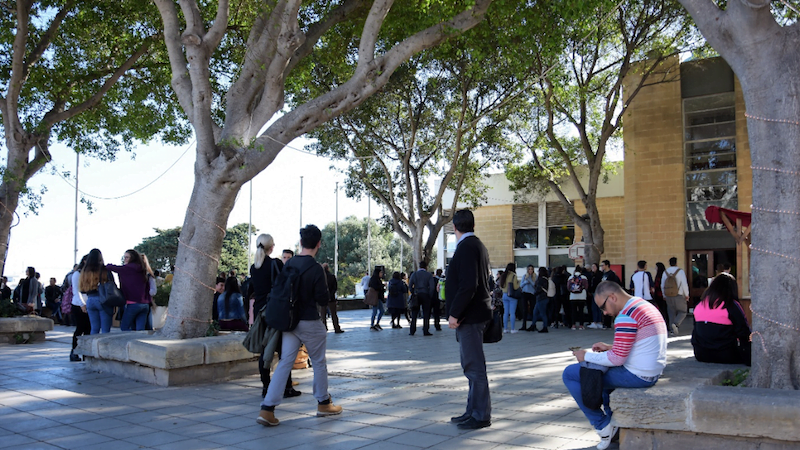Two days after Bidnija was stained with the blood of Daphne Caruana Galizia, the University of Malta campus hosted a vigil in respect for the murdered journalist. Rather than students, the university was flooded with criticism lamenting the absence of the former. To the people who were present at the monthly vigils and the protests that followed, a lack of student participation was mind-boggling, if not infuriating.
Prima facie, the suspect is apathy. Fingers point at insufficient education on citizenship that do not equip the youth with an understanding of the functioning of democracies.
But apathy is not the culprit. That all teenagers and 20-somethings are a lazy bunch is a stereotype that has little basis in reality. Their silence in political discourse could be attributed to a more widespread and toxic problem, primarily fear.
Malta is a small island with small communities that lack the anonymity of larger cities. Intelligent people know that whatever they say will have repercussions. For the younger demographic, there is a fundamental necessity of approval among their social circles. Being authentically controversial rather than complacently conformist is a risky leap, more so once Malta’s size and dense, closed-circuit network is what it is.
On campus, the southern-Mediterranean cultural omertà is particularly saturated.
Education experts somewhat controversially hold the opinion that the university student population should be reduced. Standards of entry should be raised, not made more lenient. But for a culture where everything goes and mediocrity is celebrated, excellence is laughed off the stage and sneered at.
The same goes in Malta’s highest academic institution. In Maltese literature, realism lamented the widespread disdain for intelligence. ‘Tridha tal-intellettwali!’ is a phrase intended to ridicule.
In a lecture, Albert Camus once quoted Hermann Goering, the Nazi leader, “When anyone talks to me of intelligence, I take out my revolver.” Autocracies invariably seek to limit and control free thought. But if those autocracies impose control forcefully, Malta’s is a psychological auto-castration.
Ġorġ Mallia, the dean for the faculty of media at the University of Malta, in an interview given to the Times, described two forms of threats to freedom of expression. Goering’s is a clear example of a direct threat to free speech. Mallia added that an indirect threat to freedom of speech is ‘a psychological atmosphere where I make you scared to speak your mind or to comment’.
Combatting this cultural disease is a tall order for the University.
A typical day for a typical student can start from as early as seven in the morning, with the last lecture finishing, potentially, at eight in the evening. Prolonged lectures are not an outlet for youthful energy. So, are lecturers promoting critical thinking and the quest for knowledge? Or is university solely a stepping stone into the workplace – an exercise in endurance?
The lack of political discourse might be a tentative answer. Blaming apathy is misplaced. When scratching the surface, there is a fundamental misunderstanding of politics. A lack of political literacy means that bias is confused with invalidity, and everything must be compartmentalised into red or blue.
This does not suggest that students have no voice whatsoever. There are occasional debates about Europe and policy decisions like #Vot16. What is lacking is the empowerment granted to students to speak out about causes they are passionate about. Universities should harbour the controversial, not shy away from it.
One reason for this is that our domestic political climate is centred, similar to our constitutional parents, the UK, around ideology. The fundamental problem with this is that it places ideology as a starting point, requiring initiatives and opinions to consolidate themselves with a vague and widely misunderstood school of thought.
For democracies that encourage citizen-driven causes, be it small-time campaigns or civil society actions, using ideology as a starting point is unfeasible. First of all, reality is very different to manifestos and academic textbooks. Secondly, it invites an unhealthy dose of cynicism. In the eyes of partisans, that actions must have an ultimate partisan agenda. Debate for debate’s sake is unheard of.
In a climate of fear, hate, trolls, cynicism, pika, and a backdrop of systematised political illiteracy, how empowered can we really expect students to be?
Speak Malta is organising a dialogue’ with Caroline Muscat, editor and co-founder of The Shift News on Wednesday 19 December at 7:30pm at the University of Malta. More information can be found here.












